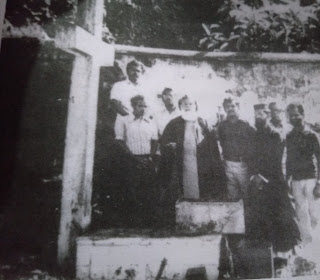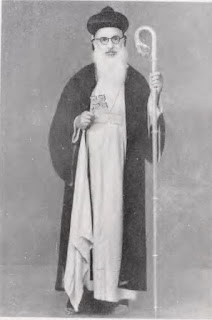Life and times of Blessed Alvares Mar Julius Metropolitan (of blessed memory). Commemorated on 23rd September.
In the early hours of 14 September 1895, around 298 Maratha sepoys of the Portuguese Indian army broke open the door of the ammunitions store at the Panjim police headquarters, gathered the arms and ammunitions and with the Maratha war cry of ‘Har Har Mahadev’, rose up in rebellion. This was the second mutiny witnessed in the Portuguese Indian army after the great mutiny of 1857 that jolted their next-door colonial neighbor in the Indian subcontinent- the British.
Blessed
Alvares Thirumeni’s name was in focus as being the instigator of the mutiny
alongwith fellow Goan - Mr. Ignacio Caetano de Carvalho, the Viscount of Bardez.
Mozambique
was another colony of Portugal and the services of the Marathas from Goa, whose
fighting spirit the Portuguese were appreciative of, was called to crush the
revolt in Africa. The highhanded decree, pitiable working conditions, low
wages, no guarantee of the period of stay in Africa or maintenance of their
families while they were away led to a high discontentment among the soldiers.
The final blow was when the soldiers were threatened to be sent to Mozambique
by force and subjected to physical violence. A
fertile cause for mutiny. Later, the mutineers were joined by the Ranes and the
revolt became so explosive that a military expedition under the command of a
royal family member had to come from Portugal.
The
allegations against Blessed Alvares Thirumeni was levelled by Captain Gomes da
Costa, the Administrator of Ilhas, who claimed that Bishop Alvares and Viscount
of Bardez were instigating the masses and the soldiers to unite and fight for
the cause “India for the Indians”. Bishop Alvares had nothing to do with the
revolt save for the fact that him pleaded for the cause of Maratha Sepoys in
his periodicals and thus the establishment’s needle of suspicion focused on him.
Another
reason why Bishop Alvares was suspected is because that newspapers in Lisbon
attributed the mutiny chiefly to Lt. Col, Julio Luis Felner, the commander of
the battalion who was greatly respected by the sepoys for he treated them
fairly. Interestingly, Lt. Col. Felner, was also accused of lending a voice in
the defense of Blessed Alvares Thirumeni when Thirumeni was tried by the Portuguese
government for ‘inciting seditious’ sentiments through his newspaper, ‘O Brado
Indiano’. Lt. Col. Felner’s visiting
card had been found in the possession of Bishop Alvares leading to speculation
that both worked hand in gloves in inciting the mutiny. What followed was a
ruthless attempt by the government to crush any ‘anti-national’ voice. A war council was established filling the
jails all those who were suspected to be associated with Ranes
revolt/mutiny. Alvares Thirumeni's periodicals were banned and his press burnt.
Thus, Alvares Thirumeni was forced to flee from his home state.
This
wasn’t the first time Blessed Alvares Thirumeni suffered for siding with the
truth and certainly it wasn’t the last.
As
a Roman catholic priest, Padre Alvares took up the editorship of the journal, ‘A
Cruz’, a religious journal dedicated to the defense of the religious and social
interests of the country that appeared in 1876,
after the untimely death of its editor Fr. Manuel Agostinho de Carvalho
due to tuberculosis. The young Padre exposed fearlessly, in each journal issue,
the excesses and the shortcomings of the Portuguese government. The situation
started to worsen with the coming of the new Archbishop- Dom
Sebastião António Valente, who also became the first Patriarch of the East
Indies when Goan archdiocese was elevated to the position of the Patriarchate
of the East Indies in 1886. Within two months of his arrival, the Archbishop
issued a decree banned ‘A Cruz’ calling it scandalous and revolutionary,
forbidding the faithful from reading it. Padre Alvares wasn’t going to take it
lying down and appealed to the Crown. The Goa High Court gave a ruling in Padre
Alvares’ favour. Satyamev Jayate.
The
was a blow to Archbishop Valente, and he used his might to file an appeal in
the Supreme Court which refused to take cognizance of his petition.
Padre
Alvares was forced to start another ‘A Verdade’ (meaning truth) since ‘A Cruz’
lost its readership due to the Archbishop’s orders. He also started other
periodicals as well- ‘O Progresso de Goa’ and ‘Times of Goa’. Archbishop
Valente became the chairman of the governing council in 1885 and Padre Alvares decided
to quit Goa owing to harassment by Archbishop Valente who now exercised both
ecclesiastical as well as civil powers. The following years saw Padre Alvares
accepting the Orthodox faith and discharging his ecclesiastical duties as being
ordained to the Episcopate as the Metropolitan of Goa, Ceylon and India
(outside Malabar).
Blessed
Alvares Thirumeni continued his journalistic duties to expose the corruptions
and shortcomings of the government. In the July 1895 issue of 'O Brado
Indiano', a riddle was published wherein the readers had to guess the name of
the army officer who did a series of offences while stationed at different
places. This provoked Capt. Gomes da Costa as he felt the references were
attributed to him. Capt. Gomes da Costa not only took the matter to court but
also demanded that a clear explanation be made in the journal's next issue as
to whether the riddle was targeted at him.
Blessed
Alvares Thirumeni gave a sharp-witted response in the next edition; he stated of
all the people, only Captain Gomes da Costa demanded for such a clarification
and that only he (Captain da Costa) can throw some light regarding his demand.
Capt. Gomes da Costa was in a spot!
The
matter ended in court when the respondents explained that it's just a riddle
and will remain so unless the reader comes with a solution.
Vengeful
Captain Gomes da Costa plotted a revenge against the venerable bishop. On 19th
August, at 7 PM, Blessed Alvares Thirumeni was returning in a horse driven car
from Santa Cruz when few policemen arrested him near the Phoenix fountain. On
the way, the policemen forcefully tried to snatch Thirumeni's pectoral cross
and ring, to which Thirumeni offered stiff resistance and said that they could
remove those only after he was dead. But the violence used against
Thirumeni was so great that he was forcibly deprived of the Episcopal signia.
The policemen didn't stop there. They stripped the venerable bishop of his
ecclesiastical vestments and paraded him to the police station in his
undergarments. Alvares Thirumeni was kept in a small filthy cell measuring 3
metres long and 1.5 metres wide smelling of urine and faeces without light,
air, or even a chair.
Cases
of apostasy, offences against Portugal's religion, including undue wearing of
clerical vestments (a 'crime' Alvares Thirumeni was convicted and cleared of in
1890). Bishop Alvares was honorably acquitted by court on reviewing the
documentary evidences. Satyamev Jayate.
Capt
Gomes da Costa's vengeance wasn't satiated. He had Alvares Thirumeni arrested
two days later citing treason and being a security threat both internally and
externally. A leading lawyer Mr. F.X. Sales de Andrade offered security of Rs
5000 (a princely sum in those times!) for Alvares Thirumeni's bail which the
judge accepted. The public prosecutor claimed that the offence was non-bailable
and submitted an appeal in the High Court. Truth triumphed again as the High
Court upheld the ruling of the lower court. Satyamev Jayate.
Facing
innumerable persecution from the Portuguese civil and clerical
authorities, Blessed Alvares Thirumeni accepted British citizenship (being a
subject of British India) in 1904 and had shifted his residence, for a considerable
time to Castle Rock (present day Karnataka).
In
1906, Alvares Thirumeni visited Goa and this time too, the Portuguese
authorities illegally detained him. The ordeal lasted more than 30 hours. The
authorities had the blessings of Archbishop Valente- the Patriarch of East
Indies (the same Archbishop who we read earlier as having banned 'A Cruz') to
take such action. That Alvares Thirumeni was a British subject or that he was
an old man was all thrown to the winds.
The vengeance of the authorities knew no bounds. The British Consul in Goa had
to intervene to release Thirumeni.
We
can't even fathom the extent of harassment and dangers which Alvares Thirumeni
had to undergo for speaking the truth and choosing the Orthodox faith. Even in
his deathbed, there were attempts to make him renounce the Orthodox faith.
It
is worth mentioning that the same Portuguese government authorities which had
accused Thirumeni of being a traitor had sent distinguished representatives to
stand in the first row of the funeral procession of Blessed Alvares Thirumeni. In the annals of history, the names of oppressors are
forgotten but names of brave souls like Blessed Alvares Thirumeni, who fought
for truth and justice till the last breath, are etched for eternity. Truth can
never be hidden forever. Satyamev Jayate.
May
the memory of Blessed Alvares Thirumeni be eternal!
In Christ,
Rincy John
References:
Carmo Azevedo; Patriot and Saint- The Life Story of
Bishop Mar Julius –I, Panjim 1988
Edavaka Pathrika,
1906- Kumbham.
George Kurian, Saint Alvares Mar Julius (A life
history), St Mary’s Orthodox Church, Ribander, Goa, Pgs-141-146 (includes
photographs).
Pratima Kamat, Mutiny in the Portuguese Army, Farar
Far, Local resistance
to colonial hegemony in Goa-1510-1912, Institute Menezes Braganza, Panaji, Goa.










